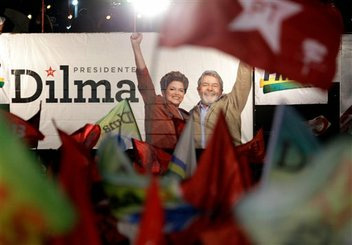
|  |  |  Americas & Beyond Americas & Beyond  
Brazil Elects Dilma Rousseff as First Female President
 Solana Pyne & Erik German - GlobalPost Solana Pyne & Erik German - GlobalPost
go to original
November 01, 2010


| | Supporters of Brazil's President-elect Dilma Rousseff wave flags of the Workers Party, in front of a campaign banner that shows her with current President Luiz Inacio Lula da Silva during the victory rally in Brasilia, Brazil, Sunday Oct. 31, 2010. Governing party candidate Dilma Rousseff was elected Brazil's president, becoming the nation's first female leader, and will take office Jan. 1. (AP/Jorge Saenz) |  |
Rio De Janerio, Brazil - Latin America’s largest democracy chose its first female president on Sunday after a hard-fought election that remained acrimonious well into a second-round runoff.

But for the new president, Dilma Rousseff, 62, the real work has only just begun.

“Dilma will have a big job in front of her,” said Carlos Santana, a political scientist at the Federal University of Rio de Janeiro. “The first step will be to bring the opposition party in for a conversation and try to create conditions of governability.”

Rousseff and her opponent, former Sao Paulo state governor Jose Serra, both ran campaigns largely pledging to continue the policies of Brazil’s hugely popular current president, Luiz Inacio Lula da Silva. With the two front-runners pushing such similar platforms, the race often turned negative. The candidates traded barbs as allegations of influence-peddling swirled around a former Rousseff aide.

“There is a lot of mistrust in the political climate of Brazil,” Santana said. “A lot of people feel resentment on both sides. Now is the time to create a bridge.”

Rousseff won with 56 percent of the vote, Brazil’s supreme electoral court reported Sunday after 99 percent of ballots were tallied. But even before voting ended, a confident Rousseff began reaching out to opponents.

“I will govern for everyone, talk to all Brazilians, without exception,” she said at an early morning breakfast before casting her own ballot.

Rousseff served as energy minister and then chief of staff under Lula, but was largely unknown before the country’s president chose her as his successor. She grew up in a middle-class home, the daughter of a Bulgarian father and Brazilian mother. In her early 20s, she joined an armed resistance group aimed at overthrowing the military dictatorship — though she says she never picked up a gun.

She was arrested and charged with subversion in 1970, and tortured and imprisoned for three years. After her release, she studied economics and moved into politics, eventually joining Lula’s government. But she had never run for office before this election. If she was known at all, it was as a tough administrator nicknamed the “Iron Lady.”

With an approval rating that tops 80 percent, experts say Lula’s relentless support during the campaign has been crucial to Rousseff’s success.

“Lula was really not only the architect but the engineer and the foreman and the worker who actually built her image,” said Alexandre Barros, a political consultant in Brasilia. “Ultimately what voters did was to trust Lula. It was a conservative vote, in that voters said, ‘Why am I going to change something that’s working so well for me.’”

The country’s economy has flourished under Lula, growing at an estimated 7 percent this year. Social policies like Bolsa Familia, the world’s largest conditional cash-transfer program, have helped pull 20 million Brazilians out of poverty.

But economists say Dilma will need to act fast to make sure Brazil keeps growing. Decades of under-investment in infrastructure have left the country’s roads, ports and airports unable to meet the demands of a booming economy. The country is set to host the World Cup in 2014 and the Olympics in 2016, but construction is already lagging on facilities needed for the events.

Rousseff also must deliver on campaign promises to improve an underperforming education system and upgrade health care. “These problems are incredibly large in Brazil,” Barros said. “We are not a Denmark. We’re talking about 195 million people.”

But, he notes, Lula’s popularity also helped Rousseff’s coalition secure a majority in both houses of Congress here, an advantage Lula never enjoyed during his eight years in office. The majority should make it easier to pass legislation.

After she takes office Jan. 1, perhaps the biggest challenge will be moving out from under Lula’s shadow.

“She is going to have to reach a balance between not deviating too much from what Lula did,” Barros said. “But on the other hand establishing a face of its own for her government. I think it’s going to be a delicate balance, but I think that she can achieve it.”
|

 |
|  |



